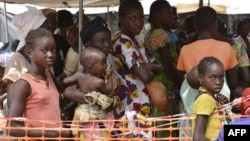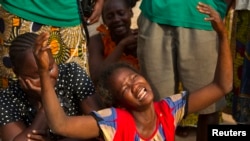GENEVA —
The World Health Organization reports the Central African Republic’s shattered health system is in desperate need of repair. A senior WHO official who just visited the CAR reports medical care throughout much of this devastated country is practically non-existent.
WHO blames years of underdevelopment and neglect from the international community for the dire situation in CAR, noting that even before the current conflict, the CAR had the third-highest maternal mortality rate and the sixth-highest child mortality rate in the world.
WHO says the situation now is worse than before - 2.5 million people are in need of emergency assistance, 800,000 people are internally displaced and since early December, more than 1,100 people have died violent deaths in the capital, Bangui.
WHO Emergency Director Rick Brennan, who visited the C.A.R. between February 7 and 12, says the devastation he saw throughout the country is unimaginable. He says the vast majority of clinics and hospitals have been extensively looted and damaged, and most medical staffers have abandoned their posts.
Homeless people are being forced into overcrowded, unsanitary camps, which only aggravates their health situation," he adds.
“In one of the camps, there is one latrine… per 100 people. The basic standard is one per 20. Six liters of water available per person per day. The standard is 15. Another camp we visited, one hand pump for 4,000 people. So, enormous needs and the capacity to respond is extremely limited,” he told reporters.
According to Dr. Brennan, WHO and its partners are setting up a surveillance system to detect and respond to disease outbreaks when they occur. He says they, along with the government, are working on a plan to reactivate the health facilities, particularly those outside Bangui.
“We need a systematic plan together with partners to ensure they are adequately staffed, have the drugs, supplies, equipment, supervision and so on. So that is…one of our main priorities over the coming weeks," the doctor said.
"We also are working to address major gaps in health services, ensuring that blood transfusion services are re-established, ensuring that women who are having babies have access to clean delivery facilities and access to emergency care when they have complications, restarting the HIV services,” he explained.
Dr. Brennan says WHO and partners need money to make the plans a reality, after only receiving $3.5 million of the $55 million needed to re-establish a functioning health system in the CAR.
The U.N. Children’s Fund says its humanitarian operation also is seriously underfunded. It only has received 15 percent of its $62 million appeal.
WHO blames years of underdevelopment and neglect from the international community for the dire situation in CAR, noting that even before the current conflict, the CAR had the third-highest maternal mortality rate and the sixth-highest child mortality rate in the world.
WHO says the situation now is worse than before - 2.5 million people are in need of emergency assistance, 800,000 people are internally displaced and since early December, more than 1,100 people have died violent deaths in the capital, Bangui.
WHO Emergency Director Rick Brennan, who visited the C.A.R. between February 7 and 12, says the devastation he saw throughout the country is unimaginable. He says the vast majority of clinics and hospitals have been extensively looted and damaged, and most medical staffers have abandoned their posts.
Homeless people are being forced into overcrowded, unsanitary camps, which only aggravates their health situation," he adds.
“In one of the camps, there is one latrine… per 100 people. The basic standard is one per 20. Six liters of water available per person per day. The standard is 15. Another camp we visited, one hand pump for 4,000 people. So, enormous needs and the capacity to respond is extremely limited,” he told reporters.
According to Dr. Brennan, WHO and its partners are setting up a surveillance system to detect and respond to disease outbreaks when they occur. He says they, along with the government, are working on a plan to reactivate the health facilities, particularly those outside Bangui.
“We need a systematic plan together with partners to ensure they are adequately staffed, have the drugs, supplies, equipment, supervision and so on. So that is…one of our main priorities over the coming weeks," the doctor said.
"We also are working to address major gaps in health services, ensuring that blood transfusion services are re-established, ensuring that women who are having babies have access to clean delivery facilities and access to emergency care when they have complications, restarting the HIV services,” he explained.
Dr. Brennan says WHO and partners need money to make the plans a reality, after only receiving $3.5 million of the $55 million needed to re-establish a functioning health system in the CAR.
The U.N. Children’s Fund says its humanitarian operation also is seriously underfunded. It only has received 15 percent of its $62 million appeal.
Over the past two months, UNICEF says 37 children have been killed and 96 maimed throughout the country. The agency says some of these children had limbs amputated because the fighting prevented them from getting medical help in time.
CAR: A Country Plunged Into Sectarian, Humanitarian Crisis
CAR: A Country Plunged Into Sectarian, Humanitarian Crisis













